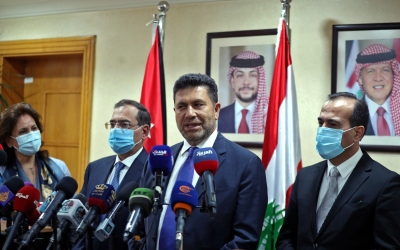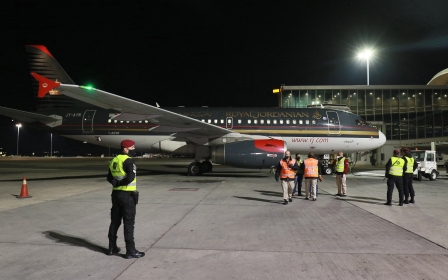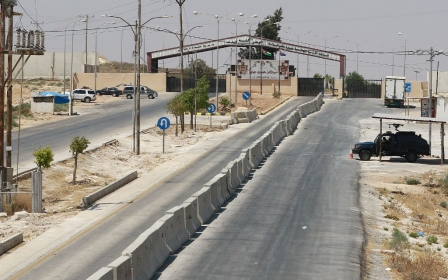Jordan fully reopens border crossing with Syria as relations improve
Jordan has fully reopened its main border crossing with Syria as ties continue to improve between the two countries.
The Nasib-Jaber crossing was at one point a transit route for hundreds of trucks a day transporting goods between Europe and Turkey and the Gulf.
The outbreak of war in 2011, however, saw the closure of the crossing, though it has been partially open since 2018 after the Syrian government drove rebels from the south.
Syria, which blames Western sanctions for its economic woes, hopes wider business links with its southern neighbour will help it recover from a devastating war and attract much-needed foreign currency.
"The aim of these understandings is to boost trade exchange between the two countries to achieve the interests of every party," Jordan's minister of industry and trade, Maha al-Ali, told state-owned Al Mamlaka television.
Officials in Jordan, a close US ally, and Lebanon have urged Washington to ease sanctions on Syria to facilitate trade.
Jordan, Lebanon, Syria and Egypt - another close US ally - this month reached an agreement for Egyptian natural gas to be sent to Lebanon via Syria using a pipeline built some 20 years ago in an Arab cooperation project.
Jordanian officials said a visiting trade delegation from Syria, led by economy, trade, agriculture, water and electricity ministers, would discuss lifting tariff barriers.
Businessmen from Jordan had largely shunned dealing with Syria after the 2019 Caesar Act - the toughest US sanctions yet that prohibited foreign companies trading with Damascus.
Amman hopes cross-border trade and renewed transport links will help boost its debt-ridden economy, badly hit last year by the coronavirus pandemic.
Jordanian businessmen have lobbied the government to ask Washington to ease restrictions on imports from Syria, where traders have long had close partnerships.
Syria’s only normally operating frontier crossing has been with Lebanon, and in recent years Iraq after the reopening of the Qaim crossing in 2019.
Flights to resume
Syrian President Bashar al-Assad has recovered most of Syria, but significant areas remain outside his control. Turkish forces are deployed in much of the north and northwest - the last rebel stronghold - and US forces are stationed in the Kurdish-controlled east and northeast.
Jordan's state airline, Royal Jordanian, will also soon resume direct flights to Damascus for the first time in nearly a decade.
The decision was one of several taken at a ministerial meeting to boost bilateral trade, investment and transport ties that ended on Tuesday in Amman.
“Jordan and the US understand that a realistic look at the political scene requires an understanding that the idea of changing the regime is no longer valid now that Syrian authorities have spread their sovereignty throughout their country,” Khaled Shneikat, the former president of the Jordanian Society for Political Sciences, told MEE last week.
Jordan, which hosts 1.3 million Syrian refugees, has been economically hurt by the cut in ties with Syria and the closure of the borders. Jordan’s trade balance with Syria dropped from $615m in 2010 to $94m in 2020, according to official Jordanian statistics.
“Jordan and a number of western countries see that stability in Syria is a priority over the presence of military groups causing problems,” Shneikat said.
Middle East Eye propose une couverture et une analyse indépendantes et incomparables du Moyen-Orient, de l’Afrique du Nord et d’autres régions du monde. Pour en savoir plus sur la reprise de ce contenu et les frais qui s’appliquent, veuillez remplir ce formulaire [en anglais]. Pour en savoir plus sur MEE, cliquez ici [en anglais].





